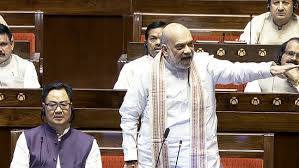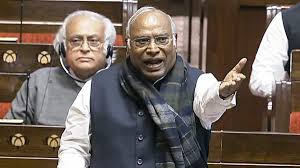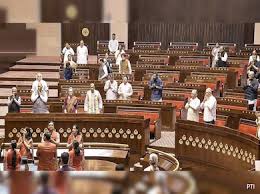Waqf Bill passed by Parliament amid heavy opposition and confrontation
 NEW DELHI : Amid demonstrations, sieges and fierce protests against the Waqf Act in states like Bihar, West Bengal, Tamil Nadu, Gujarat and Uttar Pradesh, etc., Parliament on Friday passed the Waqf (Amendment) Bill, 2025, which was also approved by the Rajya Sabha early this morning.
NEW DELHI : Amid demonstrations, sieges and fierce protests against the Waqf Act in states like Bihar, West Bengal, Tamil Nadu, Gujarat and Uttar Pradesh, etc., Parliament on Friday passed the Waqf (Amendment) Bill, 2025, which was also approved by the Rajya Sabha early this morning.
In the Upper House, 128 members voted in favour of the bill, while 95 members voted against the bill. The bill was discussed for about 12 hours in the Rajya Sabha. The Lok Sabha has already approved the bill.
After the passage of this bill, the law will be known as ‘Umeed’ (Unified Waqf Management Empowerment, Efficiency and Development) Act. The Waqf Amendment Bill now only needs the approval (a formality) of President Draupadi Murmu to become a law. Amid heated exchanges and bitter rhetoric from both sides over the Waqf Bill, Congress MP Sonia Gandhi called it a “shameless attack” on the Constitution and accused the BJP of keeping society in a state of “permanent polarisation”. At a meeting of her party MPs, the senior Congress leader also said the bill has been “bulldozed” through the Rajya Sabha.
The Rajya Sabha on Thursday (3 April) approved the Waqf Amendment Bill, 2025, which contains several important provisions, including increasing transparency in the Waqf Board, by 128 votes to 95 after a long discussion. The government claimed that the bill would greatly help in improving the condition of the poor and Pasmanda Muslims of the country along with the women of this community.
With this, Parliament approved the Waqf (Amendment) Bill, 2025 and the Muslim Waqf (Repeal) Bill, 2024.
The Lok Sabha passed it at around 2 am on Wednesday (2 April). The Upper House rejected several amendments moved by the Opposition. Parliament worked even after midnight as the Waqf Amendment Bill, 2025 was passed by the Rajya Sabha at around 2.35 am with 128 votes in favour and 95 against. The margin was less in the Upper House compared to the Lok Sabha, which passed the Bill at around 2 am on April 3 with 288 votes in favour and 232 against.
On Thursday (April 3), several Opposition members wore black clothes in Parliament in protest against the Bill. While BJP allies including the Telugu Desam Party (TDP) and the Janata Dal (United) supported the Bill in the Rajya Sabha, just like in the Lok Sabha, cracks emerged in the Opposition when the BJD spoke against the Bill but also said it had not issued a whip and its 7 MPs were free to vote according to their conscience. Andhra Pradesh’s Jagan Mohan Reddy’s YSRCP also spoke against the bill but did not issue a whip to its members.
There were no disruptions in the discussion in the Lok Sabha, but the Rajya Sabha witnessed multiple disruptions during the debate with heated exchanges between the ruling and the opposition. Opposition members criticised the bill for making Muslims “second-class citizens”, calling the bill an “encroachment on the rights of minorities” and a means to grab land, while accusing the government of using communal polarisation as a means of diversion.
The ruling party said the bill would bring transparency in the administration of waqf bodies and properties. In his response at the end of the debate, Union Minister for Minority Affairs Kiren Rijiju said the bill had nothing to do with religion but was related to property administration. Responding to the discussion on the Waqf Bill in the Rajya Sabha that lasted for more than 13 hours, Minority Affairs Minister Kiren Rijiju said that in 2006 there were 4.9 lakh Waqf properties in the country and the total income from them was only Rs 163 crore, while even after making changes in 2013, the income increased by only Rs 3 crore. He said that today there are a total of 8.72 lakh Waqf properties in the country.
He said that the bill has a provision for the Mutawalli who manages the Waqf property, its administration and monitoring it. Rijiju said, “In no way does the government manage the Waqf property and does not interfere in it.” Rijiju said that through this bill, no one other than Muslims will interfere in Waqf matters and whatever misconceptions are being spread about it are baseless. He said that the government has made many changes in the bill as per the JPC report, including the suggestion that an officer of the rank above the District Magistrate should investigate the government land declared as Waqf. Kiren Rijiju said that many opposition members said that there are many poor Muslims in the country. He said that everyone knows who ruled the country
 for most of the time and they did nothing to remove the poverty of Muslims.Rijiju said that the work of the charity commissioner provided in the bill is only to see whether the Waqf Board and the lands under it are being managed properly or not. He said that through this the government and the Waqf Board will not interfere in any religious work of any religious institution including the mosque. He said that in the new bill, members of all schools of thought of Islam will be given place in the Waqf Board. The government’s intention is to make this bill inclusive. He said that due to the provisions of this bill, the poor Muslims of the country will be benefited due to better management of the properties under the Waqf Board.
for most of the time and they did nothing to remove the poverty of Muslims.Rijiju said that the work of the charity commissioner provided in the bill is only to see whether the Waqf Board and the lands under it are being managed properly or not. He said that through this the government and the Waqf Board will not interfere in any religious work of any religious institution including the mosque. He said that in the new bill, members of all schools of thought of Islam will be given place in the Waqf Board. The government’s intention is to make this bill inclusive. He said that due to the provisions of this bill, the poor Muslims of the country will be benefited due to better management of the properties under the Waqf Board.

